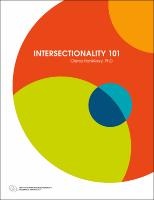| dc.description.abstract | Interest in and applications of intersectionality have grown exponentially in popularity
over the last 15 years. Scholars across the globe from a variety of disciplines, including
sociology, political science, health sciences, geography, philosophy and anthropology, as
well as in feminist studies, ethnic studies, queer studies and legal studies, have drawn on
intersectionality to challenge inequities and promote social justice. This practice has also
extended to policy makers, human rights activists and community organizers search
-
ing for better approaches to tackling complex social issues. Yet most people don’t know
about intersectionality and why it is such an innovative framework for research, policy
and practice.
The aim of this primer is to provide a clear-language guide to intersectionality; we
explore its key elements and characteristics, how it is distinct from other approaches to
equity, and how it can be applied in research, policy, practice and teaching. Most im
-
portantly, the primer aims to show how intersectionality can fundamentally alter how
social problems are experienced, identified and grasped to include the breadth of lived
experiences. | |

